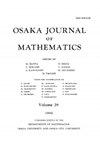关于Hamza定理的更多信息
IF 0.4
4区 数学
Q3 MATHEMATICS
引用次数: 0
摘要
在这篇短文中,我们给出了形式(1.3)(如Hamza定理中的形式)是可闭的一个充要条件,并证明了每一个正则的强局部Dirichlet形式都是Hamza型形式的闭,可以用[7]中引入的有效区间来表示。本文章由计算机程序翻译,如有差异,请以英文原文为准。
More about Hamza's Theorem
In this short article, we give a necessary and su ffi cient condition for the form (1.3), like the one in Hamza’s theorem, to be closable and prove that every regular and strongly local Dirichlet form is the closure of a form of Hamza’s type, which can be represented in terms of e ff ective intervals introduced in [7].
求助全文
通过发布文献求助,成功后即可免费获取论文全文。
去求助
来源期刊
CiteScore
0.90
自引率
0.00%
发文量
0
审稿时长
>12 weeks
期刊介绍:
Osaka Journal of Mathematics is published quarterly by the joint editorship of the Department of Mathematics, Graduate School of Science, Osaka University, and the Department of Mathematics, Faculty of Science, Osaka City University and the Department of Pure and Applied Mathematics, Graduate School of Information Science and Technology, Osaka University with the cooperation of the Department of Mathematical Sciences, Faculty of Engineering Science, Osaka University. The Journal is devoted entirely to the publication of original works in pure and applied mathematics.

 求助内容:
求助内容: 应助结果提醒方式:
应助结果提醒方式:


